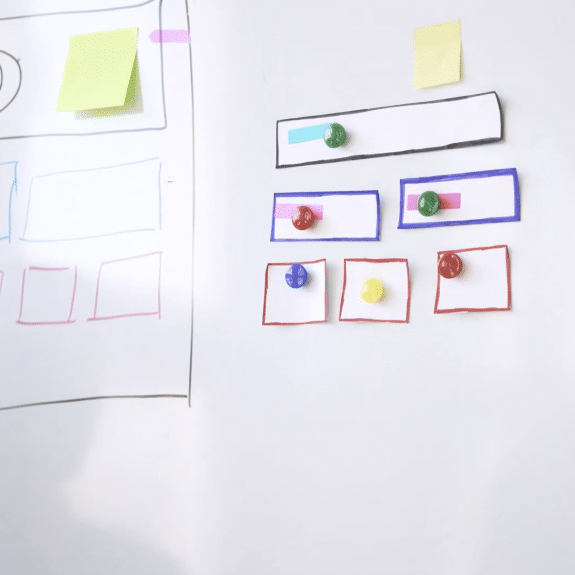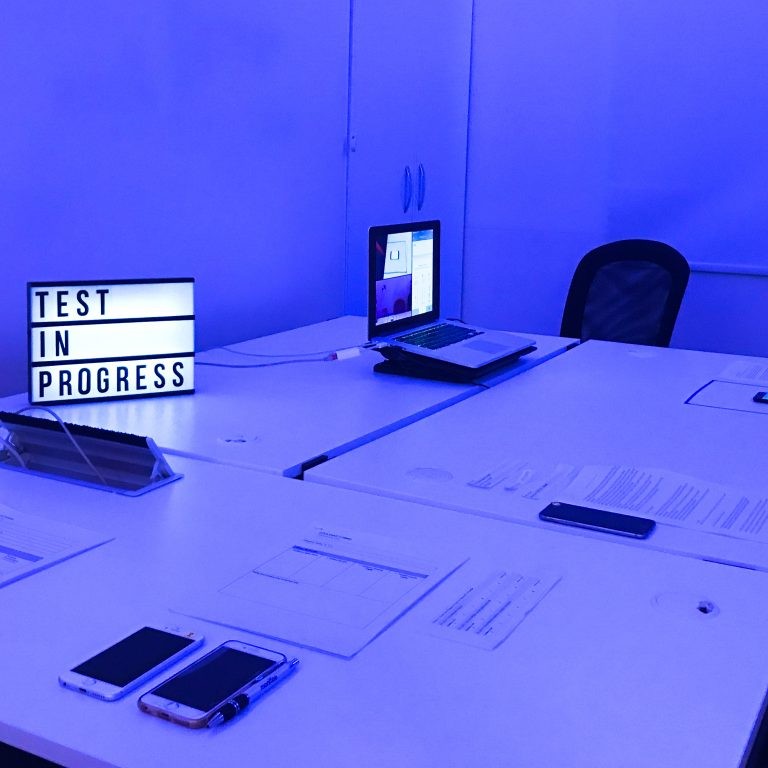Contact Tracing Apps: How Governments are responding to COVID-19
Contact Tracing Apps: How Governments are responding to COVID-19
As many countries are outlining a multiphase plan to reopen their economies, governments have been undertaking different approaches for contact tracing. While some countries are using mobile apps to enforce quarantine, others have introduced bluetooth-based mobile apps which address privacy concerns of the public.
Privacy Concerns
With the recent launch of contact tracing apps around the world, an ongoing discussion on privacy has been escalated, and privacy concerns raised by the public have been one of the key drivers for the governments to imply solutions for contact tracing.
Addressing the privacy concerns, Google and Apple have also teamed up to enable contact-tracers by creating the groundwork for Bluetooth-based apps that can work across both iOS and Android phones. The software released in around mid-May relies on Bluetooth wireless technology to detect when someone who downloaded the app has spent time near another app user who later tests positive for the virus.
Governments around the world can use the technology in their own contact tracing apps. With this release, almost all smartphones worldwide will be able to detect each other and share information about potential exposure to the disease.
Different Approaches & Solutions
We have reviewed the different approaches which have been taken by different governments for contact tracing purposes. Now, let’s look at the mobile apps developed or planned by different countries around the world.
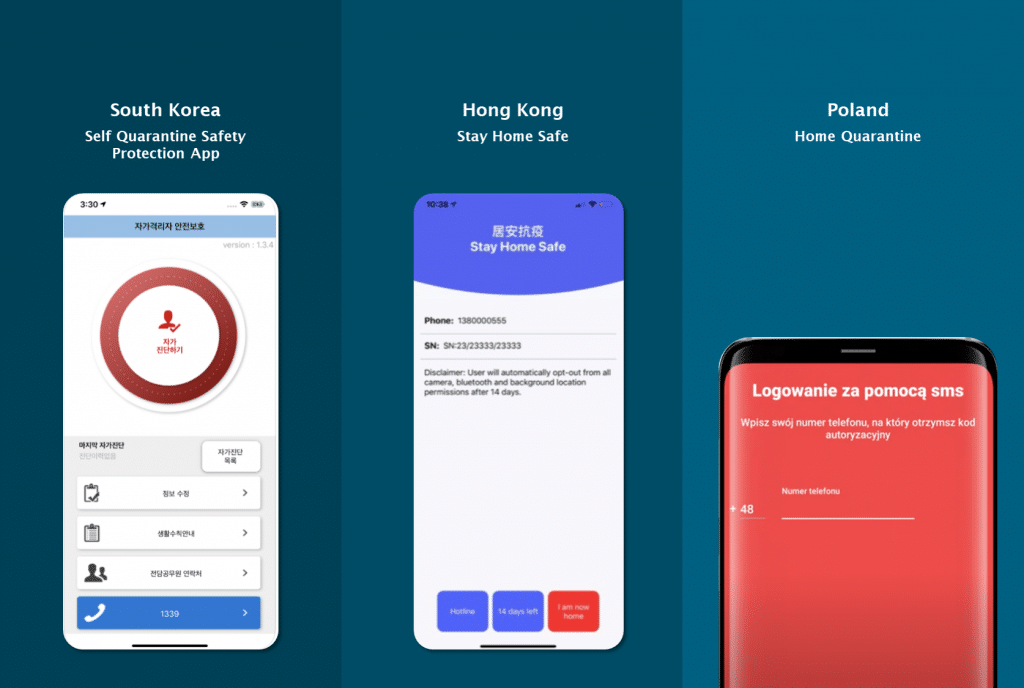
South Korea
Mobile app for quarantine enforcement and data processing for contact tracing
South Korea has successfully leveraged contact tracing system and technology to flatten its COVID-19 curve. Besides extensive testing effort, South Korea uses a coronavirus tracing system known as the COVID-19 Smart Management System (SMS).
The system takes 10 minutes to analyze the movement of the infected person’s previous contacts using data from 28 organizations such as credit card companies, smartphone companies, The Credit Finance Association, and National Police Agency. SMS, which is run by South Korea’s Centers for Disease Control and Prevention (KCDC) makes it impossible for someone who is got infected to stay private.
Also, the government enforces “Self Quarantine Safety Protection App” for those who enters Korea and allow for location tracking services in their mobile for quarantine purposes.
China
QR-code based rating system for contact tracing and quarantine enforcement
In China, citizens are a part of the Health Code system, which they can sign up through Alipay or WeChat, that assigns individuals one of three colour codes based on their travel history, time spent in outbreak hotspots and exposure to the potential carriers of the virus. Chinese residents as wells as visitors are obliged to use this QR-code based system to travel within and out of cities.
Hong Kong
Mobile app and a paired wristband for quarantine enforcement
Hong Kong imposes a mandatory 14-day self-isolation period for all travelers during the coronavirus crisis. All travelers have to fill the necessary documents, the Health Declaration Form and Compulsory Quarantine Order while getting tested by using the Covid-19 testing kit.
In order to ensure the individuals comply with self-isolation rules, the Hong Kong government requires each arrival to download the StayHomeSafe app and gives them a paired wristband that uses geofencing technology to track real-time location. In addition to the mobile app and wristband, the Hong Kong Health and Safety department regularly calls them to check location and current health status.
Poland
Mobile app for quarantine enforcement
Poland has introduced its “Home Quarantine“ app which is intended to keep people in quarantine for 14 days after returning from abroad. The app requires its users to register a selfie and then periodically update with geo-located selfies to confirm their location. If a user fails to respond to a request within 20 minutes, police will be notified.
Taiwan
Mobile phone tracking for quarantine enforcement
Taiwan uses mobile phone tracking to enforce quarantines by working with five major telecoms to triangulate phone location.
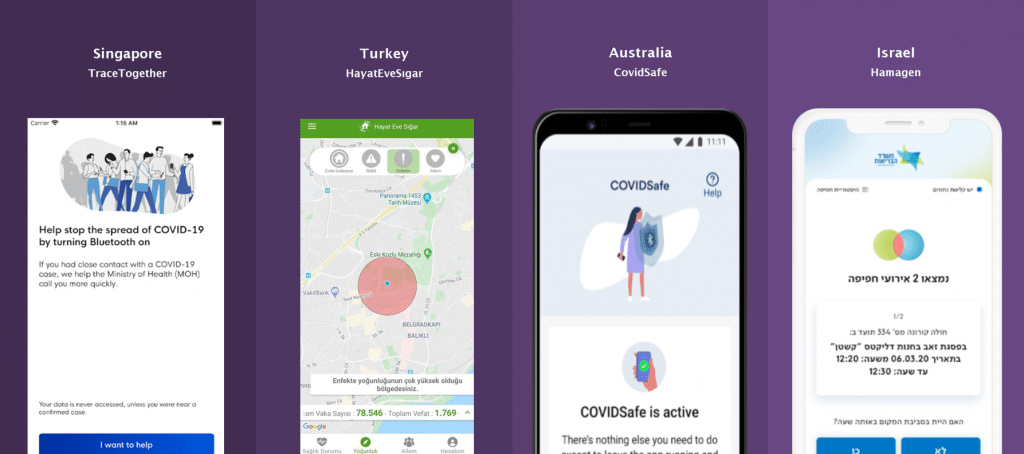
Singapore
Bluetooth enabled contact tracing mobile app
In March, Singapore has launched its TraceTogether app which can identify people who have been within 2m of coronavirus patients for at least 30 minutes, using wireless Bluetooth technology. The information is kept in the mobile device, and can only be submitted when the user is contacted by official contact tracers who have identified the user as a high-risk individual and authenticated the data transmission by the user.
Turkey
Bluetooth enabled contact tracing mobile app
Turkey has launched its mobile app called “HayatEveSığar“ to inform the public about high-risk areas in the map and trace virus’ journey using Bluetooth system. The users can also add their relatives and friends to be informed their health instantly.
The personal HES code determined within the scope of the HES program is necessity at all travels within the country. The code is used to prevent and slow the spread of the Covid-19 virus.
It provides information on who have been exposed to the virus or have been in contact with COVID-19 patients, and who therefore will not be permitted for travelling within or from the country.
Israel
Location-based contact tracing app
Israel is one of the first countries who has developed a mobile app to track its users’ movements and trace back when one is diagnosed with Covid-19. The app retains information about user’s locations solely on the device and cross-references the data with the Ministry of Health’s updated epidemiological data. So that, if a match is identified, the user is to be directed to a link to the Ministry of Health for the next steps.
Australia
Bluetooth enabled contact tracing mobile app
In Australia, the CovidSafe app allows health officials to trace the app user’s recent activities in case of infection. The app collects and stores all mobile phone numbers within a 1.5-meter range of the infected person for 15 minutes or more.
US
Multiple apps for contact tracing
In the U.S., there are multiple mobile app solutions that have been developed by private sector and universities. The contract tracing apps which have been launched recently, promise to alert people automatically if they’ve been in close proximity to some infected by COVID-19. CovidSafe, CovidWatch, SafePaths (Private Kit) are some of the apps that have been launched recently for contact tracing.
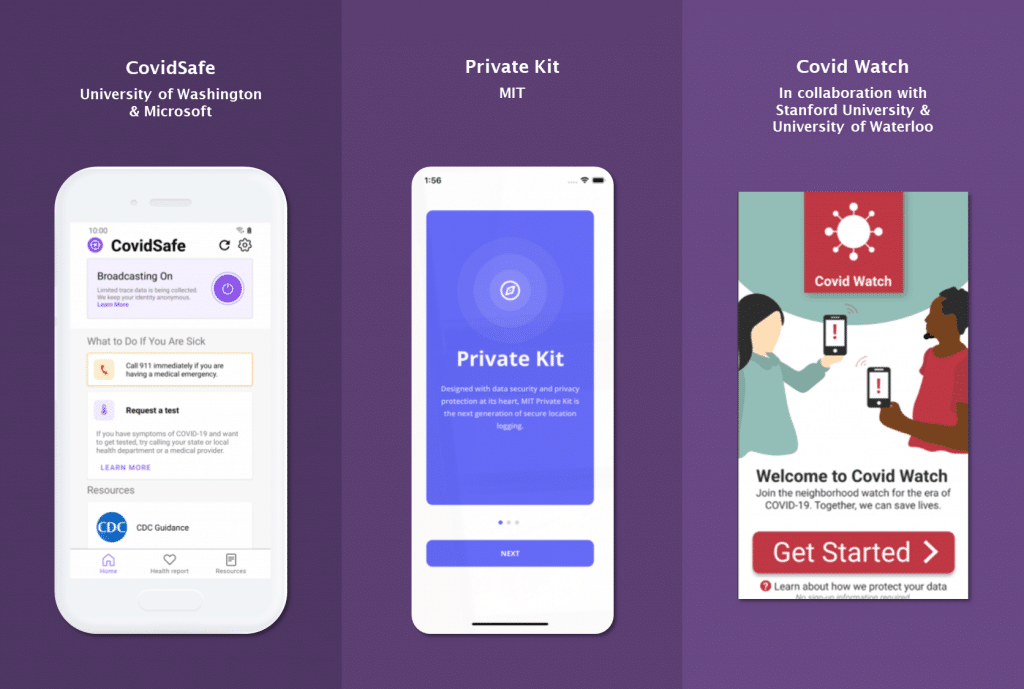
Europe
Ongoing discussion on contact tracing approach
In Europe, there have been two main approaches, centralized vs decentralized, supported by different countries.
Centralized approach which have been proposed in the region supports the storage and process of proximity data on a server controlled by a national authority. Whereas, decentralized system supports that the data should be stored locally on device and only be reached with a user’s permission after a confirmed COVID-19 diagnosis.
Backed by Germany earlier, a centralised standard called Pan-European Privacy-Preserving Proximity Tracing (PEPP-PT) has been launched having a centralized data management approach. While France and Britain are still backing centralization, Germany changed course due to the recent announcement by Apple and Google.
More contact tracing apps are to come
More countries such as Italy, New Zealand and UK are preparing to launch their own contact tracing apps joining the countries above. While contact tracing apps cannot be the sole solution for coronavirus pandemic, they become a part of central strategy of health authorities to slow down the spread of coronavirus outbreak by making tracing easy, fast and less costly using digital technologies.
Reading Time: 9 minutes
Don’t miss out the latestCommencis Thoughts and News.

Commencis
Don’t miss out the latestCommencis Thoughts and News.
04/05/2020
Reading Time: 9 minutes
As many countries are outlining a multiphase plan to reopen their economies, governments have been undertaking different approaches for contact tracing. While some countries are using mobile apps to enforce quarantine, others have introduced bluetooth-based mobile apps which address privacy concerns of the public.
Privacy Concerns
With the recent launch of contact tracing apps around the world, an ongoing discussion on privacy has been escalated, and privacy concerns raised by the public have been one of the key drivers for the governments to imply solutions for contact tracing.
Addressing the privacy concerns, Google and Apple have also teamed up to enable contact-tracers by creating the groundwork for Bluetooth-based apps that can work across both iOS and Android phones. The software released in around mid-May relies on Bluetooth wireless technology to detect when someone who downloaded the app has spent time near another app user who later tests positive for the virus.
Governments around the world can use the technology in their own contact tracing apps. With this release, almost all smartphones worldwide will be able to detect each other and share information about potential exposure to the disease.
Different Approaches & Solutions
We have reviewed the different approaches which have been taken by different governments for contact tracing purposes. Now, let’s look at the mobile apps developed or planned by different countries around the world.

South Korea
Mobile app for quarantine enforcement and data processing for contact tracing
South Korea has successfully leveraged contact tracing system and technology to flatten its COVID-19 curve. Besides extensive testing effort, South Korea uses a coronavirus tracing system known as the COVID-19 Smart Management System (SMS).
The system takes 10 minutes to analyze the movement of the infected person’s previous contacts using data from 28 organizations such as credit card companies, smartphone companies, The Credit Finance Association, and National Police Agency. SMS, which is run by South Korea’s Centers for Disease Control and Prevention (KCDC) makes it impossible for someone who is got infected to stay private.
Also, the government enforces “Self Quarantine Safety Protection App” for those who enters Korea and allow for location tracking services in their mobile for quarantine purposes.
China
QR-code based rating system for contact tracing and quarantine enforcement
In China, citizens are a part of the Health Code system, which they can sign up through Alipay or WeChat, that assigns individuals one of three colour codes based on their travel history, time spent in outbreak hotspots and exposure to the potential carriers of the virus. Chinese residents as wells as visitors are obliged to use this QR-code based system to travel within and out of cities.
Hong Kong
Mobile app and a paired wristband for quarantine enforcement
Hong Kong imposes a mandatory 14-day self-isolation period for all travelers during the coronavirus crisis. All travelers have to fill the necessary documents, the Health Declaration Form and Compulsory Quarantine Order while getting tested by using the Covid-19 testing kit.
In order to ensure the individuals comply with self-isolation rules, the Hong Kong government requires each arrival to download the StayHomeSafe app and gives them a paired wristband that uses geofencing technology to track real-time location. In addition to the mobile app and wristband, the Hong Kong Health and Safety department regularly calls them to check location and current health status.
Poland
Mobile app for quarantine enforcement
Poland has introduced its “Home Quarantine“ app which is intended to keep people in quarantine for 14 days after returning from abroad. The app requires its users to register a selfie and then periodically update with geo-located selfies to confirm their location. If a user fails to respond to a request within 20 minutes, police will be notified.
Taiwan
Mobile phone tracking for quarantine enforcement
Taiwan uses mobile phone tracking to enforce quarantines by working with five major telecoms to triangulate phone location.

Singapore
Bluetooth enabled contact tracing mobile app
In March, Singapore has launched its TraceTogether app which can identify people who have been within 2m of coronavirus patients for at least 30 minutes, using wireless Bluetooth technology. The information is kept in the mobile device, and can only be submitted when the user is contacted by official contact tracers who have identified the user as a high-risk individual and authenticated the data transmission by the user.
Turkey
Bluetooth enabled contact tracing mobile app
Turkey has launched its mobile app called “HayatEveSığar“ to inform the public about high-risk areas in the map and trace virus’ journey using Bluetooth system. The users can also add their relatives and friends to be informed their health instantly.
The personal HES code determined within the scope of the HES program is necessity at all travels within the country. The code is used to prevent and slow the spread of the Covid-19 virus.
It provides information on who have been exposed to the virus or have been in contact with COVID-19 patients, and who therefore will not be permitted for travelling within or from the country.
Israel
Location-based contact tracing app
Israel is one of the first countries who has developed a mobile app to track its users’ movements and trace back when one is diagnosed with Covid-19. The app retains information about user’s locations solely on the device and cross-references the data with the Ministry of Health’s updated epidemiological data. So that, if a match is identified, the user is to be directed to a link to the Ministry of Health for the next steps.
Australia
Bluetooth enabled contact tracing mobile app
In Australia, the CovidSafe app allows health officials to trace the app user’s recent activities in case of infection. The app collects and stores all mobile phone numbers within a 1.5-meter range of the infected person for 15 minutes or more.
US
Multiple apps for contact tracing
In the U.S., there are multiple mobile app solutions that have been developed by private sector and universities. The contract tracing apps which have been launched recently, promise to alert people automatically if they’ve been in close proximity to some infected by COVID-19. CovidSafe, CovidWatch, SafePaths (Private Kit) are some of the apps that have been launched recently for contact tracing.

Europe
Ongoing discussion on contact tracing approach
In Europe, there have been two main approaches, centralized vs decentralized, supported by different countries.
Centralized approach which have been proposed in the region supports the storage and process of proximity data on a server controlled by a national authority. Whereas, decentralized system supports that the data should be stored locally on device and only be reached with a user’s permission after a confirmed COVID-19 diagnosis.
Backed by Germany earlier, a centralised standard called Pan-European Privacy-Preserving Proximity Tracing (PEPP-PT) has been launched having a centralized data management approach. While France and Britain are still backing centralization, Germany changed course due to the recent announcement by Apple and Google.
More contact tracing apps are to come
More countries such as Italy, New Zealand and UK are preparing to launch their own contact tracing apps joining the countries above. While contact tracing apps cannot be the sole solution for coronavirus pandemic, they become a part of central strategy of health authorities to slow down the spread of coronavirus outbreak by making tracing easy, fast and less costly using digital technologies.



